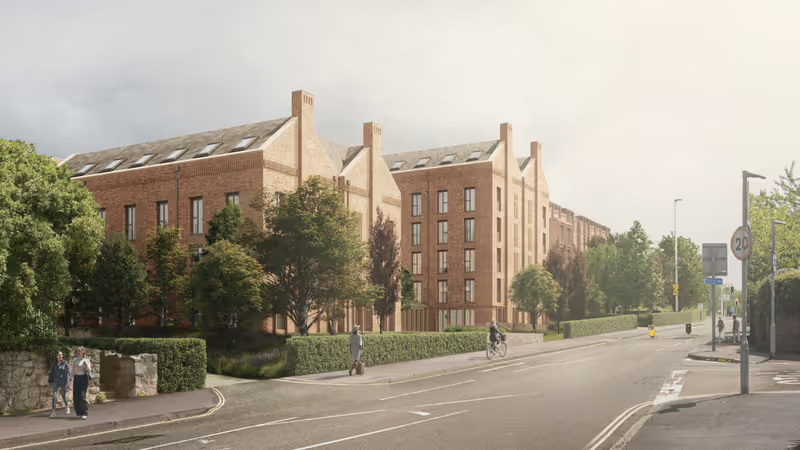The Royal Devon & Exeter NHS Foundation Trust is pushing ahead with plans to provide 205 new car parking spaces on trust-owned land near the main hospital site at Wonford.
It is carrying out the development without obtaining permission from the local planning authority under powers introduced in April as part of the government’s emergency measures to combat the coronavirus.
The new legislation gives health and local authorities conditional but wide-ranging powers to carry out development “for the purposes of preventing an emergency; reducing, controlling or mitigating the effects of an emergency; and taking other action in connection with an emergency”.
Some buildings on the site, opposite the Nuffield Hospital on Wonford Road, have already been demolished. Exeter City Council has confirmed its approval, as local planning authority, is not required.
 Demolition in progress at the new RD&E Hospital car parking site
Demolition in progress at the new RD&E Hospital car parking site
The new powers are only valid until the end of the year, although they may be extended while the pandemic continues.
However the Royal Devon & Exeter NHS Foundation Trust has submitted a separate planning application to Exeter City Council seeking permission for the car parking to remain beyond then.
Hospital management say the additional spaces will be needed until 2022, but the application does not give an end-date for use as a car park despite its description as a “temporary” facility.
 Public transport access to the hospital
Public transport access to the hospital
In policy and planning terms, the trust’s car parking proposal is contrary to what the city council and its partners, including the trust, are seeking to achieve.
Cars generate carbon emissions, so reducing the number of private car journeys in the city is an important part of the response to climate change.
By facilitating additional private car journeys, the trust is in practice saying that its short term operational needs trump the more important requirement to respond to the climate emergency.
The trust’s proposal is inconsistent with:
Exeter City Council’s recently-updated corporate plan, which reaffirms the city’s commitment to being carbon neutral by 2030. The plan also says that “sustainable means of travel will be cheaper, quicker and more convenient than private car ownership” and continues “land currently dominated by driving and parking will be freed up for social, economic and environmental uses”.
Exeter City Futures’s Net Zero Exeter plan, which has been adopted by the city council and the Liveable Exeter Place Board. This sets out pathways to achieving the 2030 goal, and echoes the statements in the city’s corporate plan about reducing the dominance of the private car.
Exeter City Council’s Air Quality Action Plan, which emphasises the necessity of reducing emissions from motor vehicles for public health.
Exeter City Council’s Local Plan Core Strategy, which commits the city to ensuring “that no more car parking is provided to serve existing and new developments than is necessary” and sets out specific measures to reduce private car use in the city.
 Royal Devon & Exeter Hospital parking sign
Royal Devon & Exeter Hospital parking sign
The trust’s planning application provides no specific evidence as to why these planning considerations should be set aside.
The Design & Access Statement accompanying its application says the new car park is “deemed essential to allow the hospital to operate, albeit at reduced capacity, as a result of the COVID-19 pandemic” and that “additional staff parking facilities are required as a result of increased reliance on private transport in the absence of any viable and safe alternative means”.
The statement also claims that “current and expected long-term social distancing restrictions on public transport and car sharing schemes have seen a drastic reduction in functionality within the hospital with disruption to patient services and care treatment”.
No specific examples of disruption are provided, which makes it difficult for local authority planning officers deciding the application to balance short-term need against longer-term disbenefits.
 Royal Devon & Exeter Hospital main visitor car park
Royal Devon & Exeter Hospital main visitor car park
The Royal Devon & Exeter NHS Foundation Trust’s chief executive is a member of the Liveable Exeter Place Board which is overseeing implementation of the Net Zero Exeter plan, and its chief financial officer sits on the board of Exeter City Futures.
The Trust’s website says it shares “the commitment to making Exeter a carbon neutral city by 2030” and says it is “committed to supporting alternative travel methods” in its Sustainable Development Management Plan, which says it is preparing a Green Travel Management Plan.
We asked the trust to provide clear evidence of the disruption it claims is being caused by the lack of 205 car parking spaces and what progress it has made on its travel management plan.
The trust sent us the following statement in reply:
“Maintaining public safety through the coronavirus pandemic has meant public transport and other travel options such as car sharing and our Park & Ride remain significantly restricted. This has resulted in greater demand for car parking at the hospital.
“To ensure that patient parking can be prioritised, the Trust has obtained temporary planning permission to convert some unused RD&E buildings off Wonford Road into a NHS keyworker car park.
“Whilst the Trust is absolutely committed to moving towards more sustainable ways of working and achieving Exeter’s aim of being carbon neutral by 2030, we have had to be pragmatic about the impact of COVID-19 on travel.
“However, we are still working to deliver our sustainable travel plan which includes improved cycle routes around the city and more cycle facilities on site.
“The recently installed electric bikes are proving very popular as has the cycle to work scheme – over 200 staff make use of this each year.
“There is of course more to be done and we are continuing to work with local partners for broader changes that promote sustainability and improve the wellbeing of local people and our communities.”










